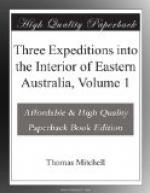SEND OFF A COURIER TO SYDNEY.
We were still about 120 miles from Buree, a distance which could be travelled over on horseback in three days, and William Baldock, who was in charge of the horses, was very willing to be the courier. The party was to proceed by a new route in the morning, consequently I had only the night for writing all my letters.
September 5.
I sent off my courier at ten A.M., having ordered him positively not to encamp at waterholes, but only to let his horse drink, fill his own horn, and choose his resting-places at a distance from any water. He was also instructed to ask any natives he might meet with if they had met the other whitefellows, etc. This last being a ruse to prevent the tribes from annoying him, which they were more likely to do when they saw him quite alone.
The Doctor and two men were sent forward at an early hour along the banks of the Bogan in search of waterholes. We followed in the same direction, crossing to the right bank at that very pond at the junction of Bullock creek which saved the lives of the cattle after they had thirsted two days (April 16). We finally encamped on some good pools after a journey of seven miles. The Doctor joined us long after it was dark and reported that he had found plenty of water all along the bed of the river as far as he had proceeded, which was about ten miles higher, in a direct line.
MARKS OF MR. DIXON.
Near where we encamped the marks of Mr. Dixon’s cattle and horses were very plainly visible, and by their depth we perceived how very wet and soft the ground had then been.
TANDOGO CREEK AND MAGNIFICENT PINE FOREST.
September 6.
We set forward on a bearing of east-south-east, which I took to be the general direction of the Bogan, considering the position of Croker’s range on the east, and that of the hills in the south, which I had traced. We travelled through forests of magnificent pine trees (Callitris pyramidalis) and crossing, at twelve miles further, a dry creek which appeared to be that of Tandogo, we encamped on the Bogan where there was a good pond of water. This abundance was the more acceptable as we had now left behind a part of the bed of this little river which for thirty miles was




